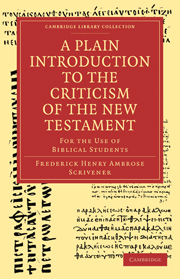Book contents
- Frontmatter
- ADVERTISEMENT
- ADDENDA ET CORRIGENDA
- Contents
- CHAPTER I PRELIMINARY CONSIDERATIONS
- CHAPTER II ON THE GREEK MANUSCRIPTS OF THE NEW TESTAMENT
- CHAPTER III ON THE ANCIENT VERSIONS OF THE NEW TESTAMENT IN VARIOUS LANGUAGES
- CHAPTER IV ON THE CITATIONS FROM THE GREEK NEW TESTAMENT MADE BY EARLY ECCLESIASTICAL WRITERS
- CHAPTER V ON THE EARLY PRINTED, AND LATER CRITICAL EDITIONS OF THE GREEK NEW TESTAMENT
- CHAPTER VI ON THE LAWS OF INTERNAL EVIDENCE, AND THE LIMITS OF THEIR LEGITIMATE USE
- CHAPTER VII ON THE HISTORY OF THE TEXT, INCLUDING A DISCUSSION OF RECENT VIEWS OF COMPARATIVE CRITICISM
- CHAPTER VIII ON THE PECULIAR CHARACTER AND GRAMMATICAL FORM OF THE DIALECT OF THE NEW TESTAMENT
- CHAPTER IX APPLICATION OF THE FOREGOING MATERIALS AND PRINCIPLES TO THE CRITICISM OF SELECT PASSAGES OF THE N. T.
- INDEX I
- INDEX II
- INDEX III
- Plate section
CHAPTER VI - ON THE LAWS OF INTERNAL EVIDENCE, AND THE LIMITS OF THEIR LEGITIMATE USE
Published online by Cambridge University Press: 05 August 2011
- Frontmatter
- ADVERTISEMENT
- ADDENDA ET CORRIGENDA
- Contents
- CHAPTER I PRELIMINARY CONSIDERATIONS
- CHAPTER II ON THE GREEK MANUSCRIPTS OF THE NEW TESTAMENT
- CHAPTER III ON THE ANCIENT VERSIONS OF THE NEW TESTAMENT IN VARIOUS LANGUAGES
- CHAPTER IV ON THE CITATIONS FROM THE GREEK NEW TESTAMENT MADE BY EARLY ECCLESIASTICAL WRITERS
- CHAPTER V ON THE EARLY PRINTED, AND LATER CRITICAL EDITIONS OF THE GREEK NEW TESTAMENT
- CHAPTER VI ON THE LAWS OF INTERNAL EVIDENCE, AND THE LIMITS OF THEIR LEGITIMATE USE
- CHAPTER VII ON THE HISTORY OF THE TEXT, INCLUDING A DISCUSSION OF RECENT VIEWS OF COMPARATIVE CRITICISM
- CHAPTER VIII ON THE PECULIAR CHARACTER AND GRAMMATICAL FORM OF THE DIALECT OF THE NEW TESTAMENT
- CHAPTER IX APPLICATION OF THE FOREGOING MATERIALS AND PRINCIPLES TO THE CRITICISM OF SELECT PASSAGES OF THE N. T.
- INDEX I
- INDEX II
- INDEX III
- Plate section
Summary
WE have now described, in some detail, the several species of external testimony available for the textual criticism of the New Testament, whether comprising manuscripts of the original Greek (Chap. II.), or ancient translations from it (Chap. III.), or citations from Scripture made by ecclesiastical writers (Chap. IV.). We have, moreover, indicated the chief editions wherein all these materials are recorded for our use, and the principles that have guided their several editors in applying them to the revision of the text (Chap. v.). One source of information, formerly deemed quite legitimate, has been designedly passed by. It is now agreed among competent judges that Conjectural Emendation must never be resorted to, even in passages of acknowledged difficulty, in the absence of proof that the reading thus substituted for the common one is actually supported by some trustworthy document. Those that have been hazarded aforetime by eminent scholars, when but few codices were known or actually collated, have seldom, very seldom, been confirmed by subsequent researches: and the time has now fully come that, in the possession of abundant stores of variations collected from memorials of almost every age and country, we are fully authorised in believing that the reading which no manuscript, or old version, or primitive Father has borne witness to, however plausible and (for some purposes) convenient, cannot safely be accepted as genuine or evert as probable.
- Type
- Chapter
- Information
- A Plain Introduction to the Criticism of the New TestamentFor the Use of Biblical Students, pp. 369 - 378Publisher: Cambridge University PressPrint publication year: 2010First published in: 1861



